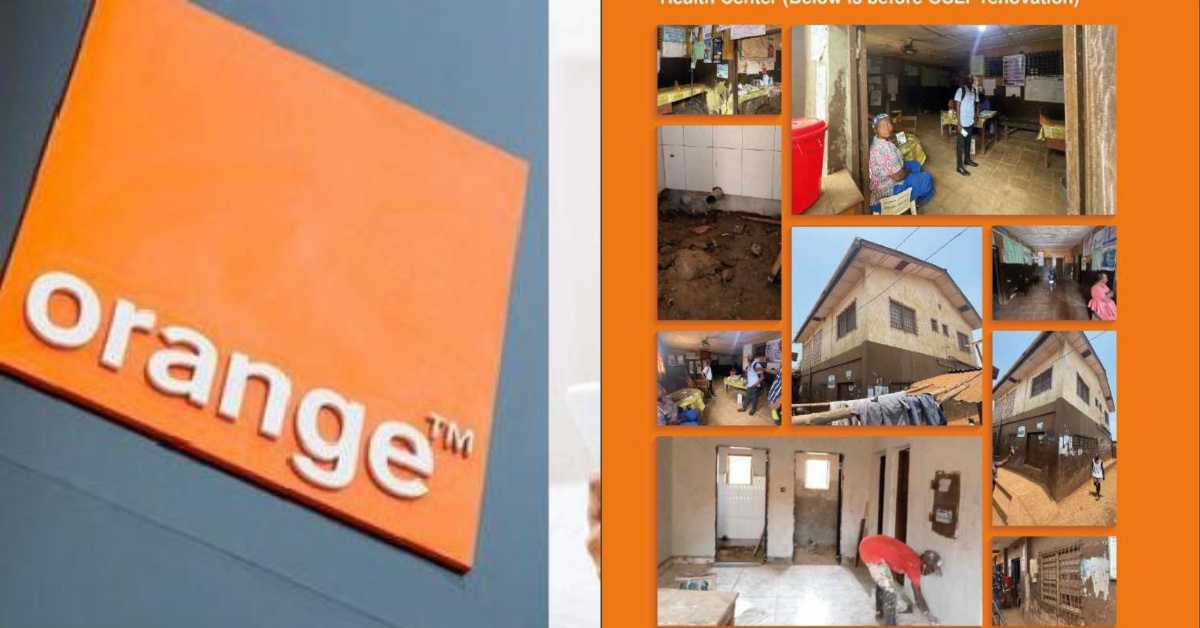Pregnant women and lactating mothers at Kroo Bay community were jubilant last Friday after Orange Sierra Leone handed over newly renovated health facility to them. The renovation is a fulfilment of a pledge made last year by leading telecoms service provider in the country.
The health centre badly needs repairs after it has fallen into disrepairs over 10 years ago. The lack of comfort in delivery room is one that makes women shy away from delivering in the health centre for a long time. It is a factor that fuels maternal and child deaths.
In a state of elation, the women sang and clapped in appreciation of Orange Sierra Leone. Neatly painted, tiled and sanitised, the facility suits the comfort of women, and invites them to give birth there. By their songs, women’s willingness to visit the new health centre is now high. In a colorful handing over ceremony yesterday, several personalities in the heath sector including the Director of Reproductive and Child Health, Dr Tom Sesay were in attendance. In her address to the women, Director for Orange Foundation Jestina Betts assured them that Orange Sierra Leone’s mission is to improve maternal and child health in Kroo Bay community. ecent statistics indicates that Sierra Leone is one the worst countries for a woman to give birth, and that Kroo Bay, the biggest and densely populated slum community in Freetown remains the most vulnerable community, she went on became a focus or the maternal health project launched in 019 owing to ICAP (International Centre or Aids Care and Treatment Programmes) data on maternal deaths.
KrooBay was the highest in vulnerability according to ICAP data. We will make a difference with our partnership with ICAP,” the Orange Sierra Leone foundation Director assured.
Betts further informed the audience that Orange Sierra Leone started the health project in Kroo Bay by screening for malaria, HIV (Human Immuno Deficiency Virus) and other diseases..
It was a pilot project, and the company had been pulling and pushing against all odds, and plans for extension of health services exist. She however called on the women to attend antenatal and postnatal clinics to safeguard their health and that of their babies. A multi-screening room, she assured, would be opened for proper treatment of women to whom she appealed to take ownership of the health facility.
A bright future awaits those pregnant women who attends clinics as baby packs would be offered them free of cost upon giving birth.
An ICAP official, Emeka King said his agency came into the community based on a partnership with Orange Sierra Leone to cut down on the rolling statistics of maternal and child deaths. King also informed the audience that ICAP had worked with Ministry of Health and Sanitation in several health aspects in Sierra Dr: Leone, and that his institution had enjoyed a good relationship with Kroo Bay community since their deployment there.
“Our key priority is to improve maternal
health in the community,” he assured. To realise this goal, he went on, ICAP conducted health education for 2, 000, identified 396 pregnant women, provided start-up kits to 50 pregnant women, and and provided blood pressure and HIV sugar screening services for safe delivery. ICAP, he said did not stop there but ensured to enhanced IPC (Infection Prevention and Control) standards in the health facility by ensuring proper disposal of used instruments and Sanitation among others. “With ICAP, death of children and pregnant women would be a thing of the past in the community,” he assured.
Speaking on behalf of MoHS, Dr Tom Sesay confirmed that Sierra Leone is still a challenging place for women to give birth.
“Close to 2,000 women die out of 100, 000 live births,” he pointed out. He however stated that the figure had been 717 deaths out of 100, 000 live births, and that his ministry is working hard to keep the figure at an appreciable level or even ensure zero Occurrence.
Dr Sesay also pointed out bleeding as one of the major health complications women encounter during deliveries, and that 15 out of 100 women suffer from such complications. The Reproductive Health Director singled out giving birth at homes as the main cause of the complications. Women, he said, were most times attended by traditional birth attendants who lack basic medical knowledge. He therefore encouraged women to give birth in the health facility, and urged nurses to immediately refer complicated cases to senior medical officers so that lives could be saved. “Without the right intervention, life could be lost within one to two hours,” he said, Medicines Dr Sesay went on, should be bought at hospital where there is proper care and high storage system. Education also plays a big role in saving the lives of pregnant women and the children. The Demographic Health Survey conducted every five years shows that women who are educated have high chances of survival during delivery than those who are not educated, Dr Tom says.
“It is painful for a woman to lose a child during delivery. Life could be lost in the process of looking for another child,” he lamented. Dr Sesay has been working with Orange Sierra Leone since Corona Virus broke out in March, 2020. Section Chief at Kroo Bay community, Pa Alimamy Kargbo the 1st appreciated Orange Sierra Leone for the good work. He appealed for more.
Joint cutting of the tape by Chief Executive Officer, Orange Sierra Leone, Sekou Amadu Bah, Dr Tom Sesay and Jestina Betts formed part of the occasion.











